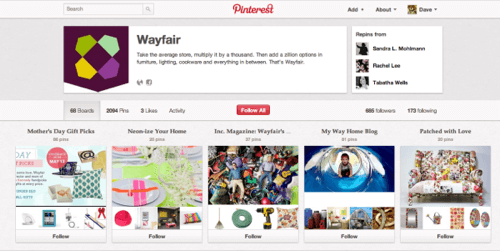Here’s a statistic that may make you do a double take: Pinterest (which is still in beta) sends more referral traffic than Twitter despite having a user base only seven percent as large as the microblogging service’s numbers. That was one of the findings in a study released last Wednesday by Eloqua as part of a product launch, which also found that Pinterest is responsible for as much referral traffic as Facebook despite having just 1% of the user base of the social media heavyweight.

Taken together, it’s just more proof that Pinterest is the next [insert name of big Web 2.0 success story], at least in terms of referral traffic, although we may have to wait a while before we know if Pinterest can actually generate revenue. But does referral traffic mean you should push your brand on Pinterest, post haste?
“It’s never about more traffic referral meaning more value (at least not for my clients). It’s about the quality of the referrals, hands down,” Jasmin Bina of JB Communications said in an email. “Pinterest still wins because in my estimation, it contains a highly concentrated group of evangelists/ early adopters/ buyers/ and whatever else a brand could hope for.”
And, perhaps most importantly, Pinterest is not Facebook or Twitter.
“It’s not mainstream and about news (Twitter) or socializing (Facebook),” Bina said. “Twitter and Facebook are filled with a lot of noise that has nothing to do with products or services, whereas Pinterest is overwhelmingly populated with people sharing the ‘stuff’ that they like – stuff that is often for purchase in some form.”
No Sales Yet
Cathy Tibbles of DSWP Website Services said certain types of businesses are more likely to benefit from Pinterest. Her food-related clients have seen increases ranging from 20% to 80% in referral traffic since she started implementing Pinterest into their Web design strategy. Similar spikes are occurring – perhaps surprisingly – among clients who work in business and motivational coaching.
For businesses with a traffic-based model, she said, “Pinterest is the way to go.”
The jury isn’t in just yet, though. “However – and it’s a big however – we have yet to see any measurable increase in sales. One logical conclusion is that Pinterest is drawing a certain crowd – a window-shopping crowd,” Tibbles said.
But the key is that referral traffic is never a bad thing, even if it doesn’t translate into sales, according to social media consultant Ari Herzog.
“Why should one seek referral traffic? That’s essentially gobbledygook for word of mouth,” Herzog said. “Awareness is a powerful need…but just because Pinterest works for x target doesn’t mean it will work for y target.”
Pinterest Isn’t Responsible For Sales
Ultimately, Herzog said, how successful your referral will be depends on how well the landing site is. If readers just scan and click away, the referral is worthless.

Still, some companies are identifying certain characteristics of Pinterest users, which are encouraging for people investing time and resources into building a Pinterest presence. Wayfair, an online home goods store, has used Pinterest contests and has seen a wide range of stats, including email open rate and social media referrals, rise in their wake.
But the most telling number, according to the company’s public relations firm, is that the average Pinterest referral results in orders that are 65% higher than the overall site average.

















